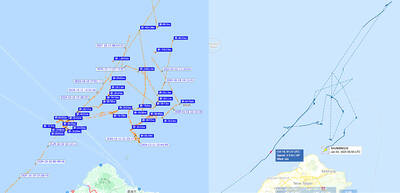The National Communications Commission (NCC) yesterday said it fined CtiTV News NT$200,000 (US$6,487) for failing to check the facts when reporting about then-Kaohsiung mayoral candidate Chen Chi-mai’s (陳其邁) rally in Cishan District (旗山) in November last year.
It was the first time since the Satellite Broadcasting Act (衛星廣播電視法) was amended in 2016 that the commission invoked Article 27, Paragraph 3, Subparagraph 4, which requires broadcasting companies to adhere to the principle of fact-checking, to penalize broadcast media.
The controversy over CtiTV’s report began when Democratic Progressive Party (DPP) Legislator Chiu Yi-ying (邱議瑩) hosted a campaign rally for Chen on Nov.11.

Photo: CNA
Toward the end of the rally, Chiu, speaking in Hoklo (commonly known as Taiwanese) thanked her supporters for staying for so long into the rally, but the news station reported that Chiu asked people not to leave.
Chiu later filed a complaint with the NCC, saying that CtiTV’s misinterpretation of her announcement affected the tone of Chen’s campaign.
The content was reviewed by an independent committee formed by third-party experts, NCC spokesman Wong Po-tsung (翁柏宗) said.
The committee found that the broadcast deliberately twisted Chiu’s statement and misled the audience, he said, adding that CtiTV did not run a correction.
Eastern Broadcasting Co (EBC) was also fined NT$200,000 for disseminating false information about African swine fever, which the commission said could undermine efforts to keep the disease out of the nation.
The committee ruled that EBC News breached Article 27, Paragraph 3, Subparagraph 3 of the act, which bans satellite broadcasting companies from producing content that could disrupt public order and adversely affect good social customs, Wong said.
EBC Evening News on Dec.13 reported that people who purchased products on the Chinese e-commerce site Taobao (淘寶) were given pork sausages as gifts and said that the sausages could be contaminated with the disease, the committee said.
The program’s headline suggested that people thoroughly cook the sausages before eating them or throw them away, but that is not the correct way to handle pork from disease-affected areas as suggested by the Bureau of Animal and Plant Health Inspection and Quarantine, the commission said.
Under the act, broadcasting companies can be fined NT$200,000 to NT$2 million for breaching the subparagraphs, Wong said.
However, EBC News changed the headline of the report after its news department identified the problems with it, Wong said, adding that the commission therefore handed it a more lenient fine.
Regarding the controversies caused by last year’s broadcast of commercials produced by the Happiness of Our Next Generation Alliance, a group opposed to same-sex marriage, Wong said that the independent committee told the commission that it should remind all broadcast media business associations to pay attention to diversity when broadcasting commercials.
The commission would also hold a seminar this year to discuss how advertisements could be more balanced in reflecting public opinion on different issues.
In related news, the commission yesterday passed a draft for a proposed media diversity preservation and monopolization prevention act, which is soon to be submitted to the Executive Yuan for review.
The draft act would ban mergers among terrestrial television services, the commission said, adding that mergers among satellite broadcasters and cable broadcasters would be banned if any party holds more than 30 percent of the market share.
The bill also includes clauses that prohibit cable television systems from engaging in cross-media integration if they own more than 20 percent of the nation’s cable service subscribers.
A broadcasting company can own no more than three media outlets, it said.
For cases that do not fall into any of the stated categories, the commission would review media mergers with a list of criteria and ensure that they do not compromise the public interest, the commission said.
Management at financial holding companies would also be barred from holding more than 10 percent of a media company’s shares or directly or indirectly controlling its personnel, finance and operations, it said.

A strong continental cold air mass and abundant moisture bringing snow to mountains 3,000m and higher over the past few days are a reminder that more than 60 years ago Taiwan had an outdoor ski resort that gradually disappeared in part due to climate change. On Oct. 24, 2021, the National Development Council posted a series of photographs on Facebook recounting the days when Taiwan had a ski resort on Hehuanshan (合歡山) in Nantou County. More than 60 years ago, when developing a branch of the Central Cross-Island Highway, the government discovered that Hehuanshan, with an elevation of more than 3,100m,

Taiwan’s population last year shrank further and births continued to decline to a yearly low, the Ministry of the Interior announced today. The ministry published the 2024 population demographics statistics, highlighting record lows in births and bringing attention to Taiwan’s aging population. The nation’s population last year stood at 23,400,220, a decrease of 20,222 individuals compared to 2023. Last year, there were 134,856 births, representing a crude birth rate of 5.76 per 1,000 people, a slight decline from 2023’s 135,571 births and 5.81 crude birth rate. This decrease of 715 births resulted in a new record low per the ministry’s data. Since 2016, which saw

SECURITY: To protect the nation’s Internet cables, the navy should use buoys marking waters within 50m of them as a restricted zone, a former navy squadron commander said A Chinese cargo ship repeatedly intruded into Taiwan’s contiguous and sovereign waters for three months before allegedly damaging an undersea Internet cable off Kaohsiung, a Liberty Times (sister paper of the Taipei Times) investigation revealed. Using publicly available information, the Liberty Times was able to reconstruct the Shunxing-39’s movements near Taiwan since Double Ten National Day last year. Taiwanese officials did not respond to the freighter’s intrusions until Friday last week, when the ship, registered in Cameroon and Tanzania, turned off its automatic identification system shortly before damage was inflicted to a key cable linking Taiwan to the rest of

China’s newest Type-076 amphibious assault ship has two strengths and weaknesses, wrote a Taiwanese defense expert, adding that further observations of its capabilities are warranted. Jiang Hsin-biao (江炘杓), an assistant researcher at the National Defense and Security Research, made the comments in a report recently published by the institute about the Chinese Communist Party’s (CCP) military and political development. China christened its new assault ship Sichuan in a ceremony on Dec. 27 last year at Shanghai’s Hudong Shipyard, China’s Xinhua news agency reported. “The vessel, described as the world’s largest amphibious assault ship by the [US think tank] Center for Strategic and International